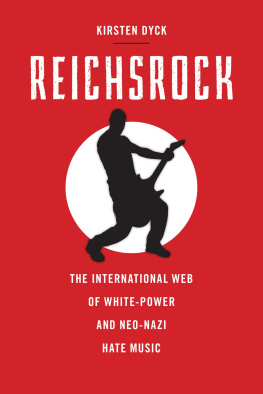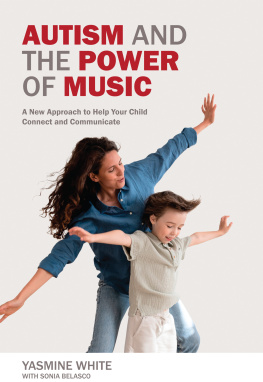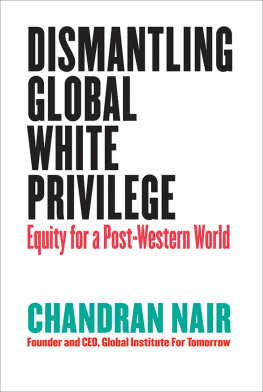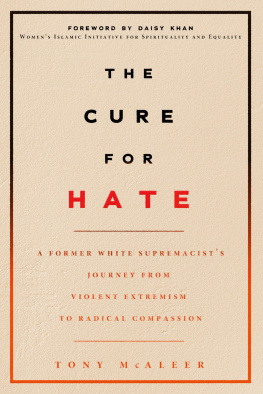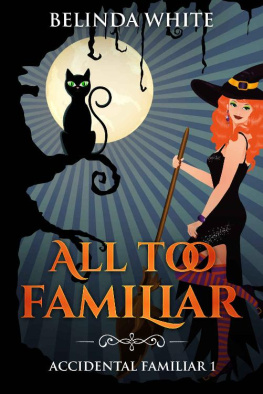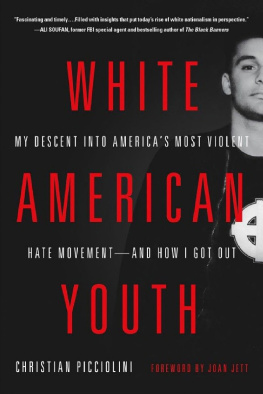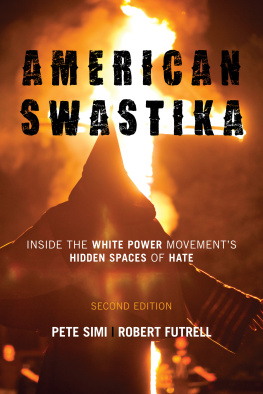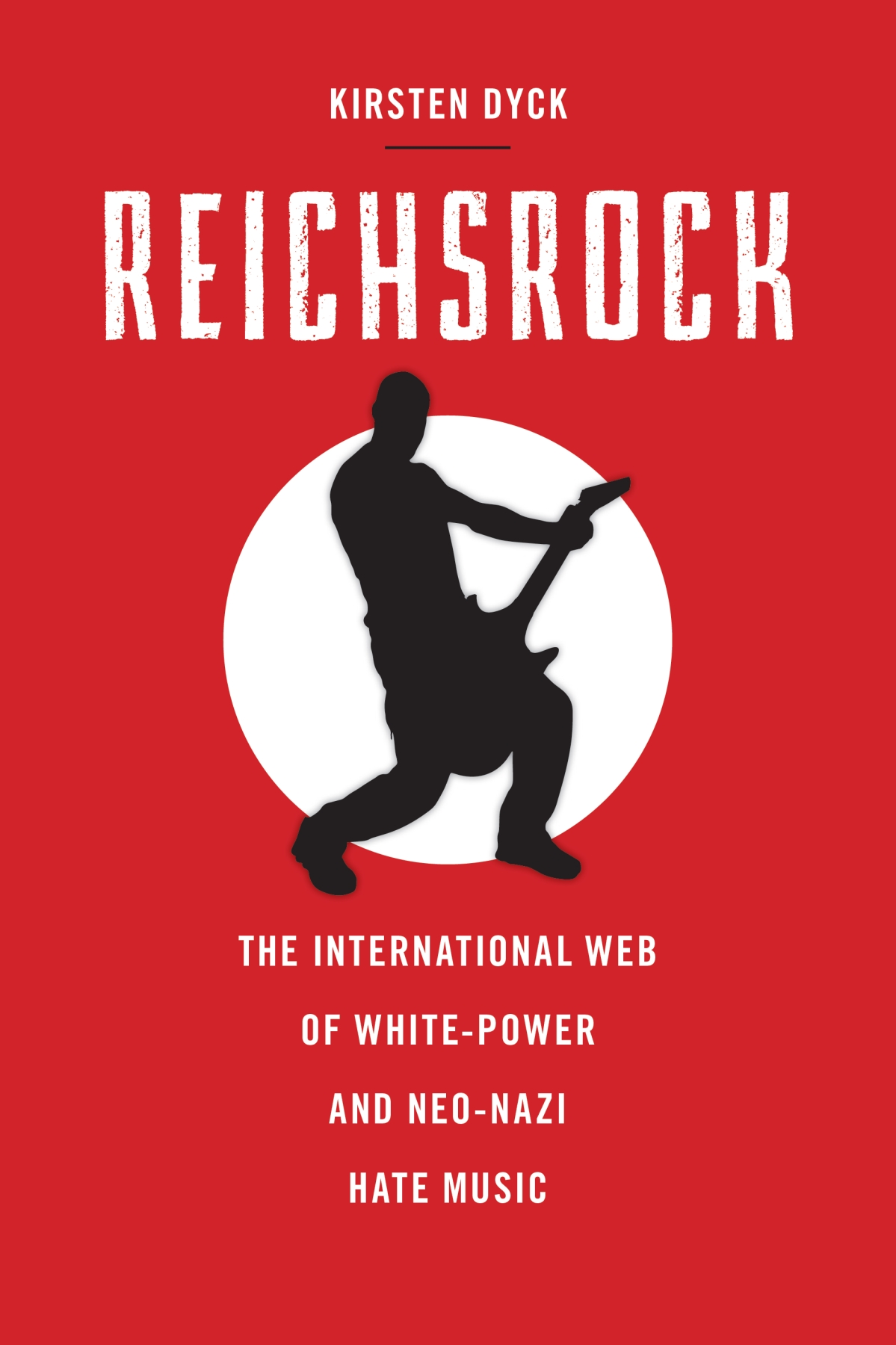
Reichsrock
Reichsrock
The International Web of White-Power and Neo-Nazi Hate Music
Kirsten Dyck

Rutgers University Press
New Brunswick, New Jersey, and London
Library of Congress Cataloging-in-Publication Data
Names: Dyck, Kirsten, 1983- author.
Title: Reichsrock : the international web of white-power and Neo-Nazi hate music / Kirsten Dyck.
Description: New Brunswick, New Jersey : Rutgers University Press, [2016] | 2016 | Includes bibliographical references and index.
Identifiers: LCCN 2016003234| ISBN 9780813574714 (hardcover : alk. paper) | ISBN 9780813574707 (pbk. : alk. paper) | ISBN 9780813574721 (e-book (epub)) | ISBN 9780813574738 (e-book (web pdf))
Subjects: LCSH: Heavy metal (Music)Social aspects. | Heavy metal (Music)Political aspects. | Punk rock musicSocial aspects. | Punk rock musicPolitical aspects. | White supremacy movements. | Neo-Nazism. | Hate groups.
Classification: LCC ML3918.R63 D87 2016 | DDC 306.4/842dc23
LC record available at http://lccn.loc.gov/2016003234
A British Cataloging-in-Publication record for this book is available from the British Library.
Copyright 2017 by Kirsten Dyck
All rights reserved
No part of this book may be reproduced or utilized in any form or by any means, electronic or mechanical, or by any information storage and retrieval system, without written permission from the publisher. Please contact Rutgers University Press, 106 Somerset Street, New Brunswick, NJ 08901. The only exception to this prohibition is fair use as defined by U.S. copyright law.
Visit our website: http://rutgerspress.rutgers.edu
For my parents, Arthur and Suzanne Dyck, who have helped me to edit more drafts of this book than I reasonably should have asked them to read
Contents
This book was made possible (in part) by funds granted to the author through a 2014 Cummings Foundation Fellowship at the Jack, Joseph and Morton Mandel Center for Advanced Holocaust Studies of the United States Holocaust Memorial Museum. The statements made and views expressed, however, are solely the responsibility of the author. I am also grateful to the Emerging Scholars Program at the Mandel Center for Advanced Holocaust Studies for its support in the preparation of the manuscript and of the book proposal. I appreciate, in particular, the help of Steven Feldman from the Mandel Center, who helped me to revise my work and to connect with interested publishers.
This book was also supported through a 20112012 Fulbright grant from the German-American Fulbright Commission, as well as the former Music, Conflict and the State research group at Georg-August-Universitt Gttingen, which hosted me during my tenure as a Fulbright fellow. Many thanks both to Fulbright and to the members of the research group. In addition, I am thankful for the help of both the Auschwitz Jewish Center in Owicim, Poland and the Museum of Jewish Heritage in New York City for jointly awarding me a 2011 Auschwitz Jewish Center Fellowship. I owe an immense debt of gratitude to each of these institutions for their backing and encouragement.
Also, thank you to Marlie Wasserman and the other staff members at Rutgers University Press who believed in me, invested in my project, had patience with me, and helped me to turn my manuscript into a book. Their support especially includes soliciting feedback from anonymous peer reviewers, to whom I am grateful for comments that have helped me to strengthen this book immeasurably.
I am also thankful for the guidance and research support I received from my doctoral dissertation committee in the Department of American Studies at Washington State Universitymy dissertation supervisor, C. Richard King, and committee members, David J. Leonard and John Streamas. Furthermore, I am beholden to my Fulbright project supervisor, M. J. Grant, not only for helping me to revise drafts of my work before, during, and after the period of my Fulbright grant, but also for helping me to network with European scholars who were working on the subject of white-power music. I also appreciate the assistance of the mentors who helped me with the initial stages of this research project while I was a masters student at York University, especially my supervisor, Robert Simms, as well as Robert Witmer and Robert van der Bliek.
Finally, I am grateful to the friends and relatives who have offered me emotional support and revision assistance with this project. Most importantly, I appreciate the help of my parents, Arthur and Suzanne Dyck, without whom none of this would have been possible. Also, a big thank you to Alex Parrish, who helped me to revise many preliminary drafts of this manuscript, as well as to John Niblett, who helped with the revision of the final draft. I deeply appreciate the hard work of all of these individuals.
What Is White-Power Music?
On September 24, 1993, thirty-six-year-old Ian Stuart Donaldson died of injuries he had sustained the previous day in a Derbyshire, England car accident. At the beginning of Donaldsons career, no such thing as hate rock and no coherent genre of contemporary white-power music existed. Today, online white-power music retailers like Micetrap Distribution, Label 56, and OPOS Records sell thousands of racist albums and concert videos. Many of these products pay tribute to Donaldson and his work. White-power music has developed into a global commodity that now expresses ideologies as diverse as Russian neo-Nazism, Brazilian white-nationalist separatism, and German nativism. The advent of readily accessible Internet technology has allowed pro-white racist groups from around the world to communicate more freely with one another than they did in earlier decades, marketing their music to sympathetic individuals who in previous generations might never have made contact with organized white-power activism, thereby facilitating the spread of white-power music to audiences that might not have discovered it otherwise.
Despite the influence of the Internet, white-power music and its complex ideologies still remain largely unknown in the English-language mainstream. Many readers of this book will have had little contact with white-power music due to the socially taboo, underground, niche-market, and occasionally even illegal nature of the genre in many areas. Some may even have been unaware of its existence. It is crucial, then, to address a number of important questions in order to introduce readers to this music and to explain its international appeal. How, when, and why did white-power music develop as a coherent genre of music in different geographical areas? How do white-power musicians in various places construct the racial categories of insider and outsider that are crucial both to racist ideology in general and to various localized racial hierarchies in particular? How do white-power musicians and fans in different areas interact with one another philosophically, intellectually, physically, digitally, and musically? How do outsiders to the movement react to white-power music? Perhaps most importantly, how do white-power musicians ideas reflect mainstream European-descended racial hierarchies today, and how does white-power music affect the societies around it? In answering these questions, I will explore how white-power music crosses and transcends boundaries such as national borders, language barriers, cultural differences, and historical divergences.
First, it is important to explain what I mean when I refer to the genre of music known as white-power music. While scholars have used many different terms to refer to the overtly racist music that emanates from neo-Nazi and white-power circles in western countries, for the purposes of this book, I have chosen to use white-power music because the idea of power or empowerment creates a clear distinction between the music of blatantly pro-racist groups and music that might inadvertently express racist goals, as could be the case with white-supremacist music. The term white-power music also encompasses nonrock n roll subgenres, such as hate folk and hard bass, which do not fall under the category of hate rock, another term I initially considered. White-power musicians often prefer to call this white-nationalist music, but some musicians whose work deserves consideration in a book on this genrefor example, Landser and other German neo-Nazi bands who have followed the hard-line ideology of the original Third Reich in viewing Poles and other Slavic groups as ethnically inferior to Germansdo not subscribe to the idea that all European-descended peoples should band together to form one coherent white nation. Thus, I use the term white-power music, with the caveat that authors with other research agendas might choose differently.
Next page
